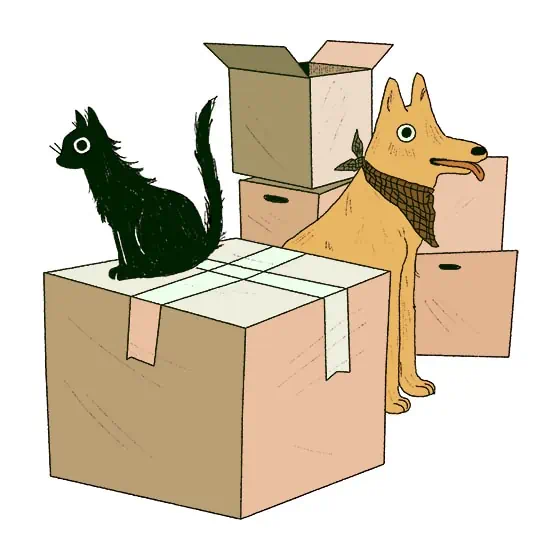Here’s a quick answer: No, you’re not supposed to help movers lift boxes or carry furniture. While it can be awkward to sit around and watch someone else do the heavy lifting, your movers are trained for the job, carry liability insurance, and have systems in place that make moves run smoothly.
But there is a way you can help your movers. Labeling boxes beforehand, clearing pathways, and making yourself available to answer questions are all easy ways to lend support without stepping into tasks that movers are trained to handle.
Still not sure what to do? We put together this guide to help you understand what to do while movers are moving your stuff. You’ll also learn what to avoid and how to prepare before movers arrive.
Table of Contents
Are You Supposed to Help Movers?
Our expert advisor, Kevin Kato, better known as Kevin the Mover, says, “Most moving companies disallow the customer from helping to lift heavy items for insurance purposes alone.” In other words, it’s best to leave the heavy lifting to the movers.
“A good rule of thumb is tipping $15 to $50 per person…[and to] keep things fair, tip each mover the same amount in cash.”
This is because professional movers are trained, insured, and have the right equipment for every job.
You can still play a crucial role in helping things go smoothly. When a customer understands how to help make their own move a success, movers love it. That leads to a better experience for everyone.
What to Do While Movers Are Moving Your Stuff
Now that you know heavy lifting is off-limits, there are still plenty of ways to support your movers without taking on big jobs yourself. As Kevin advises, “[Here’s] a secret: your movers actually do need your help … just not with the lifting.” So here are some of those tasks to do while the movers are working:
- Give a tour of the home. Start by walking movers through your home. Point out bedrooms, entrances, exits, and restrooms. If they know where things are, movers can complete the job faster, saving you time.
- Be present and available for questions. You don’t have to trail behind your movers at all times, but it’s helpful if you stay close by in case they have questions. Instead of guessing what you want them to do, they can get an answer in seconds, leaving you with more time to take care of last-minute tasks before you hit the road.
- Point out fragile or high-value items. Labeling boxes is a good start, but it’s helpful to point out fragile and valuable items. That way, your movers can take extra care when handling them.
- Stay reachable. If you have to leave the house, make sure your movers can reach you quickly by phone if they have questions. Leaving without notice can cause unexpected delays.
- Unplug things from outlets. Stopping to unplug lamps, electronics, and other items slows down the loading process. Unplug everything before your movers arrive.
- Set aside anything you don’t want movers to touch. Movers aren’t mind readers. If there are items you don’t want them to load on the truck, keep those items in a separate place. This includes medications, jewelry, medical devices, and personal documents.
Keep Pets and Kids out of the Way

On moving day, there’s a flurry of activity. You have multiple people hauling heavy furniture and trying to load fragile items without breaking them. One big way to help your movers is to keep kids and pets out of the way.
If possible, have a trusted friend or family member watch your kids off-site. Otherwise, set up some activities in an out-of-the-way location. For example, an empty bedroom is a great place to play board games or watch movies on a tablet.
Consider boarding your pets to prevent them from getting underfoot, stressed out due to all the activity, or slipping out of an open door or window while everyone is distracted with the move. Without pets or kids running around, movers can focus on working quickly and keeping your belongings safe.
How to Offer Support When Movers Are Working
Prepping your home for movers is a good way to make their job easier. But there are still a few things you can do to assist them while they’re doing their jobs. They do a lot of heavy lifting, so any support you can provide is certainly appreciated.
Here’s what we recommend:
- Designate a bathroom for movers to use. Kevin the Mover explains, “Customers sometimes like to remark how their movers are superhuman. We appreciate the compliment, but remember that we actually are humans. Designate a bathroom for us to use if and when necessary.”
- Offer water and snacks. Moving is a highly physical job, so it’s important for movers to stay hydrated. If you want to be even more helpful, have some light snacks ready. Avoid common allergens, such as tree nuts, in favor of things like carrot sticks, cheese, and apple slices.
- Double-check pathways before movers arrive. When you’re planning a move, it’s easy to get sidetracked. You won’t want to wake up on moving day and discover the hallway filled with clutter. Double-check pathways before the movers arrive to ensure there are no obstacles.
- Maintain open lines of communication. If you have any special requests, communicate them early on. Open communication makes moving day less stressful.
Things You Should NOT Do While Movers Are Working
We’ve covered the helpful stuff, but it’s just as important to know what not to do. As Kevin the Mover puts it, “There are a hundred things you can do as a customer to help your movers; just please understand that none of them involve being a mover.”
- Don’t lift heavy items. Avoid the temptation to pick up furniture or haul boxes like you’re competing in a strongman contest. Pro movers know what they’re doing, so there’s no need to micromanage or hover.
- Don’t disappear completely. Stay in contact with your movers. If you have to step out for a meeting or appointment, make sure they can reach you or give a trusted friend or family member your contact info.
- Don’t wait until the last minute to pack. As Kevin the Mover says, “This is moving’s toughest, most time-consuming task. On move day, it’s worse. Get it done ahead of time (unless you’ve paid for us to do it for you, which will cost you more).”
How to Prepare Before Movers Arrive

Whether you’re moving across the country or switching to a new unit in the same building, it’s essential to plan ahead. Having a clear plan sets your movers up for success and reduces moving-day stress.
Being upfront about stairs, heavy items, and specialty items can also help you get a more accurate estimate from the moving company. You won’t have to worry about surprise charges, and your movers will have the right equipment to complete your move safely.
Kevin the Mover advises, “Be as specific as you can. ‘A bunch of books’ doesn’t mean anything. ‘Three 6-foot bookshelves packed to the breaking point’ is a lot better.” Your moving company also needs you to answer these questions:
- Is your driveway curved and steep?
- Are there low-hanging wires or tree branches around?
- How close to your apartment building can we park the truck, if we’re bringing one? — FYI, forward-thinking customers who have a space prepared for the moving truck earn extra appreciation from their movers.
- Will it be a long walk from your door to the truck?
Now that your movers have all the information they need, you can take extra steps to prepare for their arrival:
- Pack everything properly. Unless you’re using a packing service, have everything packed the night before. We mean completely packed. Boxes sealed, moving blankets wrapped around large items, and furniture ready to go.
- Reserve parking or elevator space. If you live in a building with multiple units, you might have to reserve a parking spot for the moving truck. High-rise buildings often require elevator reservations, so make sure you get one in place before moving day.
- Disconnect appliances. Disconnect your stove, fridge, washer, dryer, microwave, and other appliances. If you have gas appliances, contact a plumber for assistance.
- Have payment and tips ready. If you didn’t pay in advance, have everything ready when your movers arrive.
- Drain the gas out of mowers. It’s not safe to travel with gasoline in a moving truck. Avoid safety issues by draining gasoline into an approved container.
- Break down shelves and furniture. Breaking things down ahead of time saves movers the effort. Note: Many movers won’t break down furniture made of particle board, as it’s likely to crack.
Do Movers Expect Tips or Extra Help?
Movers do a lot of work in a short amount of time, so tipping is customary. How much should you tip, though? It depends on the size of the job, your budget, and your overall experience. For example, you may want to tip more if the job involved several flights of stairs, or your movers really went above and beyond.
A good rule of thumb is tipping $15 to $50 per person, depending on the factors above. For example, if it takes 2 movers 3 hours to finish the job, you might want to tip them $25 each.
“Stay in contact with your movers. If you have to step out for a meeting or appointment, make sure they can reach you or give a trusted friend or family member your contact info.”
If it took them 8 hours, we’d bump that up to $50 each in recognition of their hard work. To keep things fair, tip each mover the same amount in cash. Don’t tip with a credit card, ask for change, give all the cash to one person, or tip before the job is over.
We also recommend that you avoid telling movers that any food you provided was their tip. It can make things awkward.
Other Ways to Show Your Appreciation
Money isn’t the only way to show your appreciation. In addition to a cash tip, here’s a bit of advice from Kevin the Mover:
“Do you have an all-day job? This means a lunch break, and movers will never be upset if you offer to buy them lunch. Pizza works. Sandwiches are great.”
It’s also helpful to leave a review on HireAHelper and other public-facing sites. Positive reviews help moving companies get new customers, so sharing your experience goes a long way toward helping your movers stay employed.
Final Thoughts on Helping Movers the Right Way
The main benefit of hiring a pro is that you can relax while someone else lugs boxes, lifts furniture, and loads every last item into a moving truck or shipping container.Your main job is to stay organized, maintain open lines of communication, and let your movers do what you’re paying them to do. Following these tips ensures a successful moving day for everyone.

